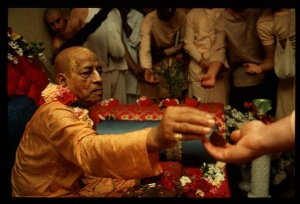CC Madhya 22.156-157: Difference between revisions
m (1 revision(s)) |
(Vanibot #0054 edit - transform synonyms into clickable links, which search similar occurrences) |
||
| (One intermediate revision by one other user not shown) | |||
| Line 1: | Line 1: | ||
{{ | [[Category:Sri Caitanya-caritamrta - Madhya-lila Chapter 22|C156]] | ||
<div style="float:left">'''[[Sri Caitanya-caritamrta|Śrī Caitanya-caritāmṛta]] - [[CC Madhya|Madhya-līlā]] - [[CC Madhya 22|Chapter 22: The Process of Devotional Service]]'''</div> | |||
<div style="float:right">[[File:Go-previous.png|link=CC Madhya 22.155|Madhya-līlā 22.155]] '''[[CC Madhya 22.155|Madhya-līlā 22.155]] - [[CC Madhya 22.158|Madhya-līlā 22.158]]''' [[File:Go-next.png|link=CC Madhya 22.158|Madhya-līlā 22.158]]</div> | |||
{{CompareVersions|CC|Madhya 22.156-157|CC 1975|CC 1996}} | |||
{{RandomImage}} | |||
==== TEXTS 156-157 ==== | ==== TEXTS 156-157 ==== | ||
<div | <div class="verse"> | ||
bāhya, antara,—ihāra dui | :bāhya, antara,—ihāra dui ta' sādhana | ||
’bāhye’ sādhaka-dehe kare śravaṇa-kīrtana | :’bāhye’ sādhaka-dehe kare śravaṇa-kīrtana | ||
:’mane' nija-siddha-deha kariyā bhāvana | |||
rātri-dine kare vraje kṛṣṇera sevana | :rātri-dine kare vraje kṛṣṇera sevana | ||
</div> | </div> | ||
| Line 14: | Line 18: | ||
==== SYNONYMS ==== | ==== SYNONYMS ==== | ||
<div | <div class="synonyms"> | ||
''[//vanipedia.org/wiki/Special:VaniSearch?s=bāhya&tab=syno_o&ds=1 bāhya]'' — externally; ''[//vanipedia.org/wiki/Special:VaniSearch?s=antara&tab=syno_o&ds=1 antara]'' — internally; ''[//vanipedia.org/wiki/Special:VaniSearch?s=ihāra&tab=syno_o&ds=1 ihāra]'' — of this spontaneous love of Godhead; ''[//vanipedia.org/wiki/Special:VaniSearch?s=dui&tab=syno_o&ds=1 dui]'' — two; ''[//vanipedia.org/wiki/Special:VaniSearch?s=ta&tab=syno_o&ds=1 ta] '' — indeed; ''[//vanipedia.org/wiki/Special:VaniSearch?s=sādhana&tab=syno_o&ds=1 sādhana]'' — such processes of execution; ''[//vanipedia.org/wiki/Special:VaniSearch?s=bāhye&tab=syno_o&ds=1 bāhye]'' — externally; ''[//vanipedia.org/wiki/Special:VaniSearch?s=sādhaka&tab=syno_o&ds=1 sādhaka]-[//vanipedia.org/wiki/Special:VaniSearch?s=dehe&tab=syno_o&ds=1 dehe]'' — with the body of an advanced devotee; ''[//vanipedia.org/wiki/Special:VaniSearch?s=kare&tab=syno_o&ds=1 kare]'' — does; ''[//vanipedia.org/wiki/Special:VaniSearch?s=śravaṇa&tab=syno_o&ds=1 śravaṇa]-[//vanipedia.org/wiki/Special:VaniSearch?s=kīrtana&tab=syno_o&ds=1 kīrtana]'' — hearing and chanting; ''[//vanipedia.org/wiki/Special:VaniSearch?s=mane&tab=syno_o&ds=1 mane]'' — the mind; ''[//vanipedia.org/wiki/Special:VaniSearch?s=nija&tab=syno_o&ds=1 nija]'' — own; ''[//vanipedia.org/wiki/Special:VaniSearch?s=siddha&tab=syno_o&ds=1 siddha]-[//vanipedia.org/wiki/Special:VaniSearch?s=deha&tab=syno_o&ds=1 deha]'' — eternal body or self-realized position; ''[//vanipedia.org/wiki/Special:VaniSearch?s=kariyā&tab=syno_o&ds=1 kariyā] [//vanipedia.org/wiki/Special:VaniSearch?s=bhāvana&tab=syno_o&ds=1 bhāvana]'' — thinking of; ''[//vanipedia.org/wiki/Special:VaniSearch?s=rātri&tab=syno_o&ds=1 rātri]-[//vanipedia.org/wiki/Special:VaniSearch?s=dine&tab=syno_o&ds=1 dine]'' — night and day; ''[//vanipedia.org/wiki/Special:VaniSearch?s=kare&tab=syno_o&ds=1 kare]'' — executes; ''[//vanipedia.org/wiki/Special:VaniSearch?s=vraje&tab=syno_o&ds=1 vraje]'' — in Vṛndāvana; ''[//vanipedia.org/wiki/Special:VaniSearch?s=kṛṣṇera&tab=syno_o&ds=1 kṛṣṇera]'' — of Lord Kṛṣṇa; ''[//vanipedia.org/wiki/Special:VaniSearch?s=sevana&tab=syno_o&ds=1 sevana]'' — service. | |||
</div> | </div> | ||
| Line 21: | Line 25: | ||
==== TRANSLATION ==== | ==== TRANSLATION ==== | ||
<div | <div class="translation"> | ||
"There are two processes by which one may execute this rāgānugā bhakti—external and internal. When self-realized, the advanced devotee externally remains like a neophyte and executes all the śāstric injunctions, especially those concerning hearing and chanting. But within his mind, in his original, purified, self-realized position, he serves Kṛṣṇa in Vṛndāvana in his particular way. He serves Kṛṣṇa twenty-four hours a day, all day and night. | |||
</div> | </div> | ||
__NOTOC__ | |||
<div style="float:right; clear:both;">[[File:Go-previous.png|link=CC Madhya 22.155|Madhya-līlā 22.155]] '''[[CC Madhya 22.155|Madhya-līlā 22.155]] - [[CC Madhya 22.158|Madhya-līlā 22.158]]''' [[File:Go-next.png|link=CC Madhya 22.158|Madhya-līlā 22.158]]</div> | |||
__NOTOC__ | |||
__NOEDITSECTION__ | |||
Latest revision as of 22:54, 19 February 2024

A.C. Bhaktivedanta Swami Prabhupada
TEXTS 156-157
- bāhya, antara,—ihāra dui ta' sādhana
- ’bāhye’ sādhaka-dehe kare śravaṇa-kīrtana
- ’mane' nija-siddha-deha kariyā bhāvana
- rātri-dine kare vraje kṛṣṇera sevana
SYNONYMS
bāhya — externally; antara — internally; ihāra — of this spontaneous love of Godhead; dui — two; ta — indeed; sādhana — such processes of execution; bāhye — externally; sādhaka-dehe — with the body of an advanced devotee; kare — does; śravaṇa-kīrtana — hearing and chanting; mane — the mind; nija — own; siddha-deha — eternal body or self-realized position; kariyā bhāvana — thinking of; rātri-dine — night and day; kare — executes; vraje — in Vṛndāvana; kṛṣṇera — of Lord Kṛṣṇa; sevana — service.
TRANSLATION
"There are two processes by which one may execute this rāgānugā bhakti—external and internal. When self-realized, the advanced devotee externally remains like a neophyte and executes all the śāstric injunctions, especially those concerning hearing and chanting. But within his mind, in his original, purified, self-realized position, he serves Kṛṣṇa in Vṛndāvana in his particular way. He serves Kṛṣṇa twenty-four hours a day, all day and night.